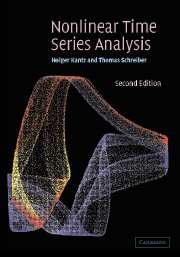Preface to the first edition
Published online by Cambridge University Press: 06 July 2010
Summary
The paradigm of deterministic chaos has influenced thinking in many fields of science. As mathematical objects, chaotic systems show rich and surprising structures. Most appealing for researchers in the applied sciences is the fact that deterministic chaos provides a striking explanation for irregular behaviour and anomalies in systems which do not seem to be inherently stochastic.
The most direct link between chaos theory and the real world is the analysis of time series from real systems in terms of nonlinear dynamics. On the one hand, experimental technique and data analysis have seen such dramatic progress that, by now, most fundamental properties of nonlinear dynamical systems have been observed in the laboratory. On the other hand, great efforts are being made to exploit ideas from chaos theory in cases where the system is not necessarily deterministic but the data displays more structure than can be captured by traditional methods. Problems of this kind are typical in biology and physiology but also in geophysics, economics, and many other sciences.
In all these fields, even simple models, be they microscopic or phenomenological, can create extremely complicated dynamics. How can one verify that one's model is a good counterpart to the equally complicated signal that one receives from nature? Very often, good models are lacking and one has to study the system just from the observations made in a single time series, which is the case for most non-laboratory systems in particular. The theory of nonlinear dynamical systems provides new tools and quantities for the characterisation of irregular time series data.
Information
- Type
- Chapter
- Information
- Nonlinear Time Series Analysis , pp. xi - xiiPublisher: Cambridge University PressPrint publication year: 2003
